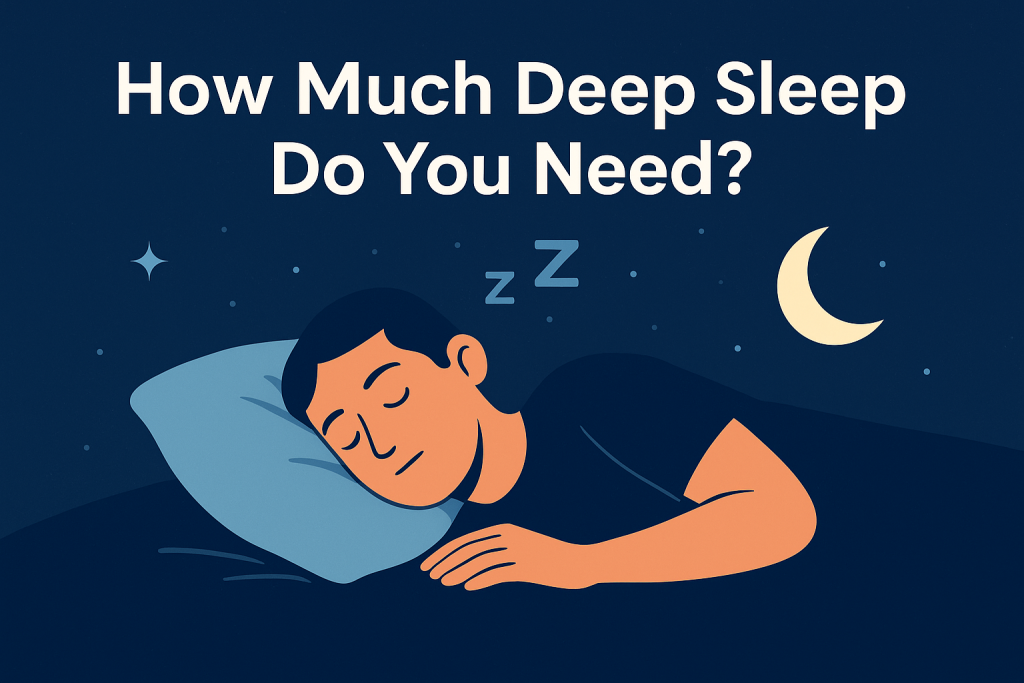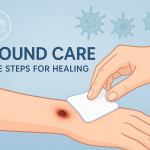How Much Deep Sleep Do You Need?
When you wake up feeling refreshed, like you could take on the world, chances are you’ve had enough deep sleep. But how much deep sleep do you really need? If you’ve ever tracked your sleep and wondered what those “deep” hours mean, or why some nights you wake up groggy, you’re in the right place. In this post, let’s break down the real answer—backed by science but written for real life.
What Is Deep Sleep, Anyway?
First, let’s get clear about what deep sleep is. Sleep isn’t just “on” or “off”—your brain goes through several stages. Deep sleep, also known as slow-wave sleep or NREM Stage 3, is the most restorative phase. It’s when your body does most of its physical repair, muscle growth, immune strengthening, and memory consolidation. If you dream of waking up with energy, deep sleep is your best friend.
How Much Deep Sleep Do Adults Need?
Here’s the straight answer:
Most healthy adults need about 1–2 hours of deep sleep per night. That’s roughly 13–23% of your total sleep time. So if you aim for the classic 8 hours of sleep, about 1–2 hours should be deep.
But (and it’s a big but), everyone’s different. Some people naturally get a little less, some a bit more. What’s important is how you feel during the day: Are you alert? Clear-headed? Or are you dragging yourself out of bed no matter how early you went to sleep?
Why Deep Sleep Matters
It’s tempting to think all sleep is the same. But deep sleep is special—it’s the phase where your body repairs tissues, builds bone and muscle, and strengthens your immune system. If you’re not getting enough deep sleep, you might notice:
-
Feeling groggy or disoriented in the morning
-
Struggling with memory or focus
-
Weaker immune system (getting sick more often)
-
Sore muscles, aches, or longer recovery after exercise
Basically, deep sleep is the body’s “reset” button.
How Much Deep Sleep Do Kids and Teens Need?
If you’re a parent, you know kids seem to sleep forever (lucky!). That’s because children and teenagers need more deep sleep—about 2–3 hours or more per night. Their bodies and brains are growing, so deep sleep is crucial.
How Can You Tell If You’re Getting Enough Deep Sleep?
Let’s be real: Most of us don’t have lab equipment at home. But you can use smartwatches or sleep trackers for a rough estimate. Still, how you feel is the best indicator. If you’re waking up tired—even after 7–9 hours of sleep—chances are your deep sleep isn’t where it should be.
Look for these signs:
-
You wake up naturally, before your alarm
-
You feel alert during the day
-
Your mood is stable, and you don’t crash in the afternoon
What Reduces Deep Sleep?
It’s not just about how long you’re in bed. Many things can reduce deep sleep, like:
-
Stress and anxiety
-
Caffeine or alcohol before bed
-
Late-night screen time (phone, TV, computer)
-
Sleep disorders (like sleep apnea)
-
Irregular sleep schedule
If you’re missing out on deep sleep, try changing one or two habits and notice how you feel.
How to Get More Deep Sleep: 5 Real-World Tips
Want more deep sleep? Here’s what works for real people (not just lab rats):
-
Stick to a Schedule
Go to bed and wake up at the same time, even on weekends. Consistency helps your body know when to enter deep sleep. -
Cool Down Your Room
Deep sleep happens best in a slightly cool, dark room—think 18–20°C (64–68°F). -
Avoid Screens Before Bed
Blue light from screens can trick your brain into thinking it’s daytime. Try to unplug 30–60 minutes before bed. -
Watch What You Eat (and Drink)
Avoid caffeine and alcohol in the evening. Both can reduce your deep sleep, even if you fall asleep fast. -
Wind Down with a Routine
Try gentle stretching, meditation, or reading a book before bed to cue your body that it’s time for sleep.
When Should You Worry About Deep Sleep?
If you’re getting 7–9 hours of sleep, following good habits, but still feel exhausted, it might be time to talk to a doctor or sleep specialist. Sleep disorders like sleep apnea can seriously cut into deep sleep, and you might need a professional assessment.
Bottom Line: Listen to Your Body
There’s no “perfect” number that fits everyone, but most adults need 1–2 hours of deep sleep each night for peak health. The good news? You don’t need fancy gadgets to know if you’re getting enough—just check in with how you feel each morning.
If you’re not waking up refreshed, try tweaking your sleep habits. Small changes can make a big difference. And remember: Sleep is not a luxury—it’s your body’s way of hitting the reset button so you can show up as your best self, every single day.


